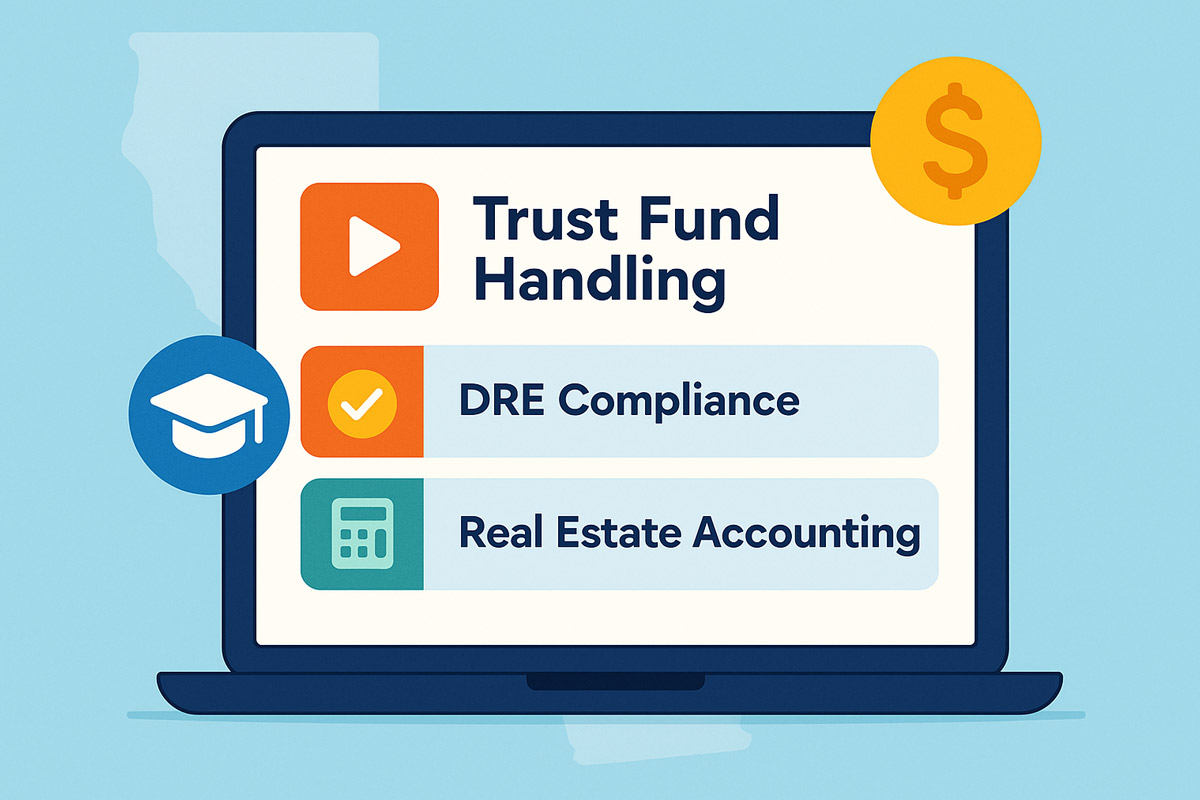Trust Fund Handling Best Practices: Ensuring Compliance During California License Renewal
MANDATORY
by Kartik Subramaniam
Reading Time: 4 Minutes

Proper trust fund handling is critical for California real estate professionals to protect clients' money and maintain their licenses in good standing. The California Department of Real Estate (DRE) mandates education in trust fund handling as part of the 45 hours of continuing education (CE) required for real estate license renewal. Failing to manage trust funds correctly can lead to serious legal consequences and even jeopardize your ability to renew or keep your real estate license. This comprehensive guide will explain why trust fund compliance matters, highlight common mistakes (and their consequences), summarize key DRE regulations, and offer best practices to keep you on track. We'll also introduce an easy, self-paced trust fund handling CE course from ADHI Schools that can help you comply with DRE regulations and complete your CE requirements.
The Importance of Proper Trust Fund Handling in Real Estate
As you learned in real estate license school, trust funds refer to money or things of value received on behalf of clients or other parties, which are held for the benefit of others in a transaction. Common examples include buyers' earnest money deposits, rental security deposits, and other funds meant to be held in escrow accounts during a deal. Handling these funds is a serious responsibility. Mismanaging clients' money not only betrays clients' trust but also violates the law. The California DRE heavily emphasizes trust fund compliance because mishandling funds can harm consumers and erode confidence in the real estate industry.
Why is proper trust fund handling so essential, especially for license renewal?
First, California requires all real estate salespersons and brokers to complete a Trust Fund Handling course as part of their continuing education for renewal. This requirement ensures that every licensee stays up-to-date on trust fund compliance rules and best practices. Second, the DRE regularly audits brokers to verify that trust funds are handled correctly. DRE audit statistics show how important this is: DRE audits regularly find trust fund shortages totaling millions of dollars, a fact that the Real Estate Commissioner has called "troubling".
Many of these issues arose in property management and broker-controlled escrow activities, but any licensee who handles client funds is under scrutiny. Unsurprisingly, some DRE's most severe disciplinary actions involve mishandling trust funds, including license suspensions and revocations. In short, if you want a smooth license renewal and a long career, you must handle trust accounts by the book.

Common Trust Fund Violations and Their Consequences
Even experienced agents can slip up on trust fund handling if they're not careful. Here are some of the most common trust fund violations that the DRE sees – along with the potential consequences for your career:
- Commingling Funds: Commingling refers to mixing client trust funds with personal or business funds. This could involve depositing a buyer's deposit check into a personal bank account or using a trust account to pay office expenses.
- Depositing personal or brokerage funds into a client’s trust account constitutes illegal commingling.
- Retaining earned commissions in the trust account beyond a short grace period is also considered commingling, as those funds no longer belong to the client.
- Conversion or Misuse of Trust Funds: In many ways conversion is even worse than commingling – it means using client trust money for a purpose other than intended, essentially misappropriating the funds. This might happen if an agent "borrows" money from a trust account to pay personal expenses or uses one client's funds to cover another client's transaction. This is a serious breach of fiduciary duty and is often treated as fraud or embezzlement. The legal and professional consequences are severe: the DRE will almost certainly initiate disciplinary action, and the agent could face civil lawsuits or criminal charges. Losing your license is a very real risk if you convert trust funds. Many real estate licenses have been revoked after a DRE audit disclosed a trust account shortage, often due to conversion or mishandling of funds.
- Failure to Deposit Funds Promptly: California regulations require that trust funds (like deposits or rent money) be deposited or delivered quickly. Specifically, a broker must transmit funds within three business days following receipt to the rightful place – that could be giving the check to the owner of the funds, placing it into a neutral escrow account, or depositing it into the broker's trust account. A common violation occurs when an agent holds onto a check for too long or forgets to deposit it promptly. For instance, if a buyer gives you an earnest money check on Monday, you generally need to get it into escrow or the trust account by Thursday (assuming no holidays) at the latest. Unless you have specific written instructions to hold an uncashed check, missing this deadline is a violation of DRE rules. The consequences can include DRE citations or fines, and if the delay causes any loss (say, the check gets lost or bounces due to delay), you could face even greater trouble. Always remember: trust funds are not yours to hold onto – they belong in a secure account fast.
- Inadequate Recordkeeping: Another frequent mistake is poor recordkeeping for trust funds. California brokers must maintain detailed records of all trust fund receipts and disbursements – every penny in or out of the trust account should be logged with the date, amount, source, payee, and purpose. You also need a separate record (ledger) for each transaction or client to show precisely how much money that client has in the trust account at any given time. If you don't keep these records up to date, it's easy to lose track of funds. A minor bookkeeping error can snowball into a significant issue. For example, you might think a check was deposited when it wasn't or accidentally use one client's money to pay out another client because your records are messy. The DRE often finds violations where brokers failed to maintain a trust fund ledger or omitted required details. Inadequate records are not just a bureaucratic issue; they can lead to actual trust fund shortages or an inability to account for client money, which is a serious violation.
- Lack of Regular Reconciliation: Even if you record all transactions, you must also reconcile the trust account regularly (at least monthly) to ensure the bank balance matches your records for all client funds. Skipping reconciliations is a common pitfall. Without reconciliation, errors or theft can go unnoticed. For example, if a bank error or an accounting typo causes the trust account to be short, you might not catch it for months. During that time, one client's money might cover another's withdrawal, creating shortages. DRE auditors often check if brokers reconcile their trust accounts monthly. When reconciliations are not done, or there are unresolved discrepancies, it's a red flag for the auditor. A trust account that doesn't balance is a huge problem – it indicates that some money is missing or misallocated. As noted earlier, any trust fund shortage is treated very seriously by the DRE and could result in formal discipline. At best, you'll be ordered to fix the procedures; at worst, you could lose your license for failing to account for client funds.
California Real Estate Law strictly prohibits commingling. For example:
Each of these violations can carry professional and legal consequences. The DRE can issue citations and fines, require you to take additional courses, or even suspend or revoke your license for significant infractions. There may also be civil liability (clients suing for damages), criminal prosecution in willful fraud, or considerable loss of client funds. Your reputation will suffer significantly if word gets out that you mishandled someone's escrow money. It's far better to prevent these errors than to face the fallout after the fact.

Convenient Continuing Education: ADHI's Trust Fund Handling CE Course
Staying compliant is easier when you have the proper knowledge and training. This is why the DRE requires a dedicated course on trust fund management as part of your continuing education. If you're looking for a comprehensive, user-friendly course that fits your schedule, consider the Trust Fund Handling CE course offered through ADHI Schools on RenewRELicense.com. This course is specifically designed for California real estate professionals who need to satisfy the 3-hour trust fund handling CE requirement for license renewal, and it goes beyond the basics to truly help you master trust fund compliance.
What the Course Covers: ADHI's Trust Fund Handling course provides step-by-step training on all the crucial aspects of managing trust funds in real estate. The course description covers the legal requirements for receiving and handling trust funds (as outlined in California Real Estate Law and the Commissioner's Regulations), the procedures for maintaining a trust account, and the detailed trust fund record-keeping requirements. In practical terms, you'll learn how to properly set up a trust account, handle deposits and disbursements within the 3-day rule, avoid commingling and conversion, keep those immaculate records, and perform monthly trust account reconciliations. It uses real-world scenarios and examples to illustrate both correct practices and common mistakes (much like we've done in this blog, but in a deeper learning format). By the end, you should feel confident about what you can do with trust funds and what you should never do.
Self-Paced and Easy to Understand: One of the key benefits of this course is that it's offered online in a self-paced format, meaning you can take it on your own time and at your own speed. Whether you prefer to knock it out in one afternoon or break it into shorter study sessions, the choice is yours. The material is presented in clear, plain language – you don't need to be a legal expert to follow along. Complex regulations are broken down into digestible lessons, and there are practice questions to reinforce your understanding. ADHI Schools prides itself on making continuing education easy for busy professionals to understand. The online platform at RenewRELicense.com is accessible 24/7, so you can log in from home or the office, on your computer or tablet, whenever you have time. Many real estate agents appreciate this flexibility, especially if you're juggling transactions and trying to complete your CE at the same time.
- Integrated with Renewal Package: If you need to complete all 45 hours for your renewal, RenewRELicense.com allows you to bundle courses. Trust Fund Handling is just one of the mandatory courses (others include Ethics, Agency, Fair Housing, etc., as mentioned in the renewal requirements). ADHI offers all these in one package so that you can do them on the same platform. This can simplify your renewal process tremendously – you won't have to scramble to find each course from different providers. Taking the Trust Fund Handling course as part of ADHI's package ensures all your CE is done under one roof and reported correctly.
ADHI's Trust Fund Handling CE course is a powerful resource for any California agent or broker. It checks the box for your renewal requirement and enriches your understanding of properly managing trust and escrow accounts. It's like getting a compliance check-up for your business. Many licensees, even those who've been in the field a long time, walk away saying they learned something new or clarified a misconception they had about trust fund rules. Given the high stakes (nobody wants to face DRE discipline), this course is a wise investment in your career.
Stay Compliant and Confident: Enroll in Our Trust Fund Handling Course Today
Trust fund handling might not be the flashiest topic in real estate, but it is one of the most important for protecting your clients and your license. California's license renewal process ensures that every agent gets a refresher on this subject for good reason – it's all too easy for small mistakes to lead to big problems regarding other people's money. The good news is that with the knowledge of best practices and a commitment to diligent management of trust accounts, you can easily stay on the right side of the regulations.
If your license renewal is coming up – or even if you want to bolster your compliance knowledge – now is the time to act. Enroll in the Trust Fund Handling CE course through ADHI Schools at RenewRELicense.com and equip yourself with the expertise to handle trust funds flawlessly. The course is self-paced and easy to start: visit the website, register for the Trust Fund Handling course, and you can begin learning immediately. In a short time, you'll earn 3 hours of CE credit on this topic and be one step closer to completing your renewal requirements. More importantly, you'll gain practical insights to help your business and ensure every client's funds are handled carefully.
Here's to your continued success as a knowledgeable, compliant, and trusted California real estate professional!

Kartik Subramaniam
Founder, Adhi Schools
Kartik Subramaniam is the Founder and CEO of ADHI Real Estate Schools, a leader in real estate education throughout California. Holding a degree from Cal Poly University, Subramaniam brings a wealth of experience in real estate sales, property management, and investment transactions. He is the author of nine books on real estate and countless real estate articles. With a track record of successfully completing hundreds of real estate transactions, he has equipped countless professionals to thrive in the industry.
Sign up for our newsletter
Recieve direct mail marketing insights to help grow your business.





